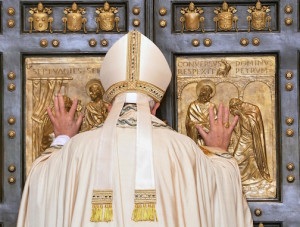St. Thomas More is reported once to have said: “The times are never so bad but that a good man can live in them.” A good saying for this year, because two things – not entirely unrelated – are likely to shake that conviction: 1) the presidential campaign, and 2) the Year of Mercy (what some are likely to make of it, anyway).
Elections are sobering things for anyone paying attention. We are all sinners, weak – and foolish. But few of us are called to stand and provide public confirmation of this age-old truth. In 2016, the disproportion between the magnitude of our problems and the smallness of the candidates who claim to be able to fix them is large, perhaps larger than ever before in our history.
The central difficulty is our core doubt about what America and Western civilization are – or might be – anymore. This is no mere policy question. The feeling is widespread and non-partisan. People across the political spectrum – and, I’ve found, in other developed nations as well – complain that they “don’t recognize” their own countries anymore. An extraordinary, almost unprecedented thing.
We’re like the Israelites in exile, except we haven’t gone anywhere: “For we are reduced, O Lord, beyond any other nation, brought low everywhere in the world this day because of our sins. We have in our day no prince, prophet, or leader. . .”
An exaggeration, perhaps, but in terms of range finding, not far from how many of us feel.

In times like these, “debates” only add to the distress – and believing that political “outsiders” will somehow deliver us is illusory. Does anyone think that if we only get taxes right, or immigration, or foreign policy, or healthcare, we’ll be back on the right road? Important issues, to be sure, but singly or together don’t address the real problem: a failing national vision.
A country sure of its identity, for example, doesn’t much worry about immigrants. But thanks to various factors (including multiculturalism and its several offshoots) in our society, we’re given to understand by elites now that we should have a chastened sense of being American. The president has lectured us that other nations also regard themselves as exceptional – which he seems to think is right for them, wrong for us.
This is dangerous and false humility in a world where Islamic jihad, Putin’s Russia, China, and other unsavory forces – with no qualms about militant self-assertion – will be only too happy to fill any vacuum America leaves. You may wish it were otherwise, but there’s no other country, no “international community” to look to at present.
And we ourselves are deeply troubled. Many particulars need fixing in America, but the thing we lack, the thing no political candidate currently seems to be able to give us, is a renewed and realistic sense of ourselves – something that has to be rooted in a truth deeper than economics and politics, in the “Creator” our Founders invoked and the condition of the American people. Without that spirit of confidence about the foundation, reforms won’t mean much.
Something like the mirror image of this has emerged in the Church since the election of Pope Francis, and is likely to be much in evidence during this Year of Mercy. He’s presented a large and inspiring vision. But many people, even many Catholics, seem to think that the vision has all but invalidated traditional practices like repentance, confession, penance, etc. They think they’ve been affirmed. (I don’t entirely blame Francis for this confusion because the world is blind to much of what he does and is happy to distort or exploit his lapses.)
Mercy, for instance, lies very close to the Christian conception of God. But as Benedict XVI argued in Caritas in veritate, things like mercy and charity cannot be understood absent truth: “Through this close link with truth, charity can be recognized as an authentic expression of humanity and as an element of fundamental importance in human relations, including those of a public nature. Only in truth does charity shine forth, only in truth can charity be authentically lived. Truth is the light that gives meaning and value to charity.”

Without truth, mercy, forgiveness, and joy easily slip into a confused sentimentality.
I’ve heard a very good priest say – from the pulpit – that it’s wrong if we come to Mass only out of duty. We need the personal relationship with God that makes it a joy – Francis’ vision. Quite so, and almost all of us who get to that point do so by showing up, from a sense of duty and fidelity to God’s commandments, even when we don’t much feel anything.
Duty and love are not mutually exclusive. Real love does what’s right even absent feeling, often by sheer effort of will. The very same priest remarked more recently that each day he tries to spend an hour in prayer, an hour in reading, an hour in exercise – disciplining soul, mind, body.
That’s the old Catholic wisdom. Ultimately, our salvation depends on grace. Penultimately, the usual human path involves struggles, temptations, trials, disappointments for a time, often a very long time, before we feel at home in the Christian life.
There are good reasons why that’s so. As Cardinal Newman noted: “Nothing is done effectually through untrained human nature; and such is ever the condition of the multitude. Unstable as water, it cannot excel. One day it cried Hosanna; the next, Crucify Him. And, had our Lord appeared to them after they had crucified Him, of course they would have shouted Hosanna once more; and when He had ascended out of sight, then again they would have persecuted His followers.”
The Church holds out a vision to the world that the world is unable to give itself – conspicuously so, these days. But during this Year of Mercy, we’ll have to take care that the vision does not obscure the very things that make any vision a reality, whatever the times.















